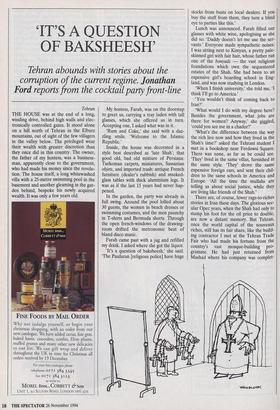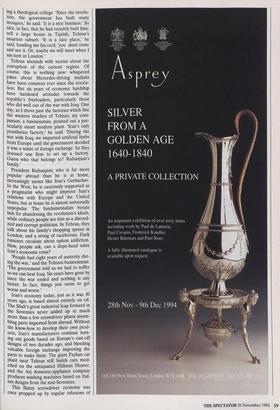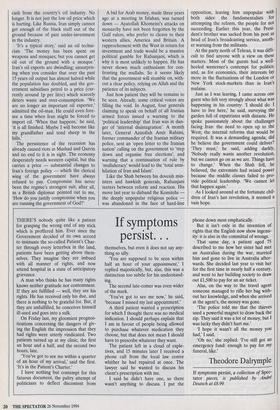`IT'S A QUESTION OF BAKSHEESH'
Tehran abounds with stories about the
corruption of the current regime. Jonathan Ford reports from the cocktail party front-line Tehran THE HOUSE was at the end of a long, winding drive, behind high walls and elec- tronically controlled gates. It stood alone on a hill north of Tehran in the Elburz mountains, out of sight of the few villagers in the valley below. The privileged wear their wealth with greater discretion than they once did in this country. The owner, the father of my hostess, was a business- man, apparently close to the government, who had made his money since the revolu- tion. The house itself, a long whitewashed villa with a 25-metre swimming pool in the basement and another gleaming in the gar- den behind, bespoke his newly acquired wealth. It was only a few years old. My hostess, Farah, was on the doorstep to greet us, carrying a tray laden with tall glasses, which she offered us in turn. Accepting one, I asked what was in it.
`Rum and Coke,' she said with a daz- zling smile. 'Welcome to the Islamic Republic.'
Inside, the house was decorated in a style best described as 'late Shah'; that good old, bad old mixture of Persiana: Turkoman carpets, miniatures, Sassanian objets, and imported trash: antique French furniture (dealer's rubbish) and smoked- glass tables with thick aluminium legs. It was as if the last 15 years had never hap- pened.
In the garden, the party was already in full swing. Around the pool lolled about 30 guests, the women in beach dresses or swimming costumes, and the men paunchy in T-shirts and Bermuda shorts. Through the open french-windows of the drawing- room drifted the metronomic beat of bland disco music.
Farah came past with a jug and refilled my drink. I asked where she got the liquor.
`It's a question of baksheesh,' she said. `The Pasdaran [religious police] have huge
stocks from busts on local dealers. If you buy the stuff from them, they turn a blind eye to parties like this.'
Lunch was announced. Farah filled our glasses with white wine, apologising as she did so: 'Daddy doesn't let me use the ser- vants.' Everyone made sympathetic noises. I was sitting next to Kimyan, a pretty pale- skinned girl with fair hair, whose father ran one of the bonyads — the vast religious foundations which own the sequestered estates of the Shah. She had been to an expensive girl's boarding school in Eng- land, and was now studying in London.
`When I finish university,' she told me, 'I think I'll go to America.'
`You wouldn't think of coming back to Iran?'
`What would I do with my degree here? Besides the government, what jobs are there for women? Anyway,' she giggled, `could you see me in a chador?'
`What's the difference between the way the rich live now and how they lived in the Shah's time?' asked the Tehrani student I met in a bookshop near Ferdowsi Square. There was none, as far as he could see. `They' lived in the same villas, furnished in the same style. 'They' drove the same expensive foreign cars, and sent their chil- dren to the same schools in America and Europe. 'All the time the mullahs are telling us about social justice, while they are living like friends of the Shah.'
There are, of course, fewer rags-to-riches stories in Iran these days. The glorious sec- ular Opec years, when the Shah had only to stamp his foot for the oil price to double, are now a distant memory. But Tehran, once the world capital of the nouveaux riches, still has its fair share, like the build- ing contractor I met at the Tehran Trade Fair who had made his fortune from the country's vast mosque-building pro- gramme. He had just returned from Mashad where his company was complet-
in g a theological college. 'Since the revolu- tion, the government has built many mosques,' he said. 'It is a nice business.' So nice, in fact, that he had recently built him- self a large house in Tajrish, Tehran's smartest suburb. 'It is a nice place,' he said, handing me his card, 'you must come and see it. Or, maybe we will meet when I am next in London.'
Tehran abounds with stories about the corruption of the current regime. Of course, this is nothing new: whispered jokes about Mercedes-driving mullahs have been common ever since the revolu- tion. But six years of economic hardship have hardened attitudes towards the republic's freeloaders, particularly those who did well out of the war with Iraq. One day, as I drove past the factories which line the western reaches of Tehran, my com- panion, a businessman, pointed out a par- ticularly smart modern plant. 'Iran's only prosthetics factory,' he said. 'During the war with Iraq, we imported artificial limbs from Europe until the government decided it was a waste of foreign exchange. So they licensed one firm to set up a factory. Guess who that belongs to? Rafsanjani's family.'
President Rafsanjani, who is far more popular abroad than he is at home, increasingly seems like Iran's Gorbachev. In the West, he is cautiously supported as a pragmatist who might improve Iran's relations with Europe and the United States, but at home he is almost universally unpopular. The fundamentalists berate him for abandoning the revolution's ideals, while ordinary people see him as a discred- ited and corrupt politician. In Tehran, they talk about his family's shopping sprees in London, and a string of racehorses. Dark rumours circulate about opium addiction. HOW, people ask, can a dope-head solve Iran's economic crisis?
`People had eight years of austerity dur- ing the war,' said the Tehrani businessman. The government told us we had to suffer so we can beat Iraq. Six years have gone by since the war ended and nothing is any better. In fact, things just seem to get worse and worse.'
Iran's economy today, just as it was 30 years ago, is based almost entirely on oil. The Shah's great industrial leap forward in the Seventies never added up to much more than a few screwdriver plants assem- bling parts imported from abroad. Without the know-how to develop their own prod- ucts, Iran's manufacturers continue turn- ing out goods based on Europe's cast-off designs of two decades ago, and bleeding valuable foreign exchange importing the parts to make them. The giant Paykan car plant near Tehran still builds cars mod- elled on the antiquated Hillman Hunter, and the Arj domestic-appliance company produces washing machines based on Ital- ian designs from the mid-Seventies. This flimsy screwdriver economy was once propped up by regular infusions of cash from the country's oil industry. No longer. It is not just the low oil price which is hurting. Like Russia, Iran simply cannot get enough of the black stuff out of the ground because of past under-investment in the industry.
`It's a typical story,' said an oil techni- cian. 'The money has been spent on weapons and mosques; but you cannot get oil out of the ground with a mosque.' Iran's oil exports are dwindling; unsurpris- ing when you consider that over the past 15 years oil output has almost halved while the population has doubled, and the gov- ernment subsidises petrol to a price (cur- rently around 1p per litre) which scarcely deters waste and over-consumption. 'We are no longer an important oil exporter,' admitted the oil-man. He could even fore- see a time when Iran might be forced to import oil. 'When that happens,' he said, 'it is all finished. Maybe I will become like my grandfather and tend sheep in the hills.'
The persistence of the recession has already caused riots in Mashad and Qazvin and no end to it is in sight. The economy desperately needs western capital, but this carries a price — substantial changes to Iran's foreign policy — which the clerical wing of the government have always refused to pay. Compromise has never been the regime's strongest suit; after all, as a British diplomat pointed out to me, `How do you justify compromise when you are running the government of God?' A bid for Arab money, made three years ago at a meeting in Isfahan, was turned down — Ayatollah Khomeini's attacks on monarchy have not been forgotten by the Gulf rulers, who prefer to cleave to their western allies, America and Britain. A rapprochement with the West in return for investment and trade would be a massive political gamble for Rafsanjani, which is why it is most unlikely to happen. He has never shown much enthusiasm for con- fronting the mullahs. So it seems likely that the government will stumble on, with- out a clear policy, relying on Allah and the patience of its subjects.
Just how patient they will be remains to be seen. Already, some critical voices are filling the void. In August, four generals claiming to speak on behalf of all Iranian armed forces issued a warning to the `political leadership' that Iran was in dan- ger of 'internal disintegration'. A month later, General Azizollah Amir Rahimi, former commander of the Iranian military police, sent an 'open letter to the Iranian nation' calling on the government to 'step down and organise free elections', and warning that a continuation of rule by `mullahcracy' would lead to the 'total anni- hilation of Iran and Islam'.
Like the Shah between his doveish min- isters and hawkish generals, Rafsanjani teeters between reform and reaction. His move last year to disband the Komitehs the deeply unpopular religious police was abandoned in the face of hard-line opposition, leaving him unpopular with both sides: the fundamentalists for attempting the reform, the people for not succeeding. Earlier this year, the Presi- dent's brother was sacked from his post as head of Iran's broadcasting service, anoth- er warning from the militants.
At the party north of Tehran, it was diffi- cult to find anyone with a view on these matters. Most of the guests had a well- heeled westerner's contempt for politics; and, as for economics, their interests lay more in the fluctuations of the London or New York stock-markets than in Iran's malaise.
Just as I was leaving, I came across one guest who felt very strongly about what was happening in his country: 'I should do. I have to live here,' he said, surveying the garden full of expatriates with distaste. He spoke passionately about the challenges facing Iran: the need to open up to the West; the internal reforms that would be required. It was a demanding agenda; did he believe the government could deliver? `They must,' he said, adding darkly, 'Nobody really wants another revolution, but we cannot go on as we are. Things have to change.' When the Shah fell, he believed, the extremists had seized power because the middle classes failed to pro- vide political leadership. 'We cannot let that happen again.'
As I looked around at the fortunate chil- dren of Iran's last revolution, it seemed a vain hope.












































































 Previous page
Previous page